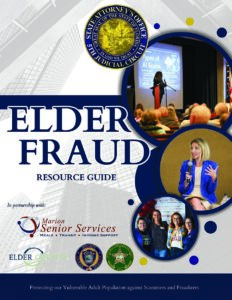December 2024 Column
SCAM ALERT #1:
It’s the holiday season, and that means you are going to get emails, text messages, phone calls, and even some door-to-door solicitations asking you to donate to this or that charity. Hopefully, many of the causes for which you are asked to donate will be worthwhile. Well, “hope springs eternal,” I guess. The problem for us is that what else springs eternal are scams designed to separate us from our money.
Here are a few of my tips for protecting ourselves from those “please-donate-money-to-this-or-that-charity” scams:
- Never give money when asked through a text message. No exceptions.
- Never provide any credit card information to a solicitor over the telephone. No written information, no donation.
- Never give money, especially by using your credit card, to someone who shows up at your door.
- Never click on an email asking for a donation unless you have verified that it’s a legitimate email for a legitimate charity.
There are many worthwhile and needy charities, but we simply cannot trust much of what we receive through emails, text messages, phone calls, door-to-door solicitations, etc. We must check, and check, and check.
SCAM ALERT #2:
The FBI website lists many possible scams. One of them is “non-delivery” of goods or services that you order online and paid for. Another is where the seller of an item wants you to pay with a gift card.
Here are ways to protect yourself, all of which you already know, but here are a few reminders:
- Do not click on attachments in emails.
- Do not click on an email that looks suspicious.
If you receive an email asking you to update your information, it is probably a scam. Call the company from a number you know or find on your own, but not one that is in the email asking you to update.
My golden rule is: If I have any reason to think it’s suspicious, including a “gut” reaction, it’s surely a fraud.
Q: I have been told that I can create an irrevocable trust and name myself as the owner and trustee of all my assets. Since it is an irrevocable trust, it will protect me from any creditors and any lawsuits where my assets are at risk. Can you comment?
A: My guess is that you misunderstood what you were told. If someone creates a trust, which means he or she is the grantor, and then puts his or her own assets into the trust but retains complete control of the trust assets, this is a self-settled grantor trust and is not going to be a form of asset protection to the grantors, especially if the grantors retain control over how the assets are spent or are used. Simply because a trust is called or is named “irrevocable” does not, in and of itself, mean the grantors’ assets in the trust are asset-protected. Best to check this with your attorney.
Q: Can a holographic will that I wrote out and signed in (another state, not Florida), with no witnesses and no notary, be a valid will here in Florida, where I now reside?
A: A holographic will is written in the handwriting of the person who made it. It could also be typed. Florida does permit holographic wills, but they need to be properly witnessed by at least two persons over the age of 18, who must state in the will that they saw the testator sign it. It might be difficult to prove it in a Florida court, but it can be. It’d also be better to have it notarized.
I am aware that some states, I believe North Carolina is one, allow or authorize a holographic will that has no witnesses at all but is signed by the testator. That is not true in Florida, where there must be witnesses who sign that they did see the testator sign the will and they knew it was a will.
Author: Colen & Wagoner, P.A.
Jerry Colen, Rachel Wagoner, and John Beck are law partners at the Law Office of Colen & Wagoner, P.A. Jerry Colen and Rachel Wagoner are members of the National Academy of Elder Law Attorneys, and the Academy of Florida Elder Law Attorneys. John Beck has a degree in finance and master’s degrees in accounting and taxation.
The law firm practices in the areas of wills, trusts, probate, real estate, elder law, business litigation, Medicaid planning, and business/professional advice. This column does not, nor is it intended to, provide legal advice. You should always consult your own attorney for legal advice.
The Law Office of Colen & Wagoner, P.A. is located at 1756 North Belcher Road, Clearwater, Florida 33765 and in Suite 11 at Circle Square Commons in Ocala, Florida. Contact us at 727-545-8114, info@colenwagoner.com, or visit colenwagoner.com.




